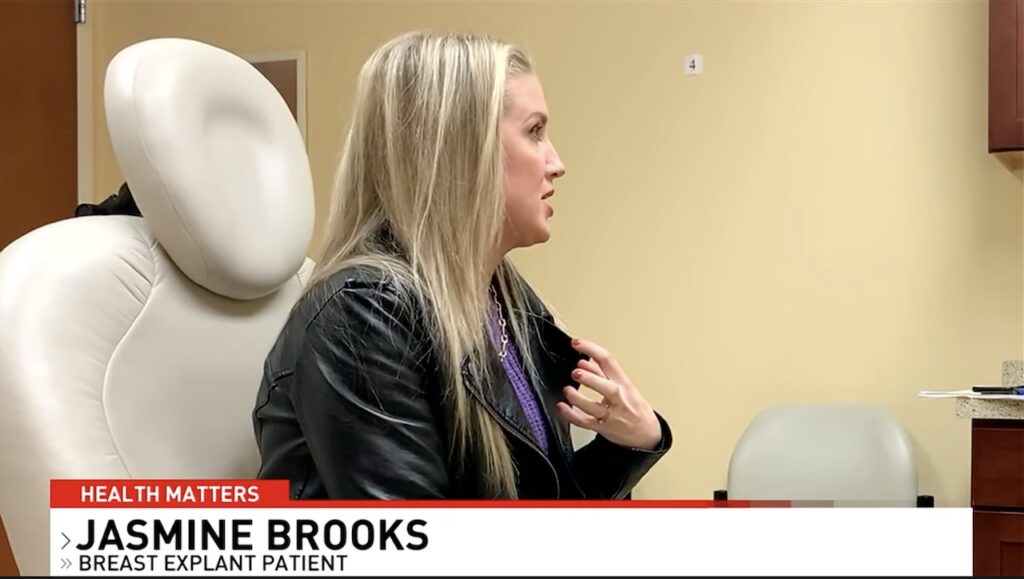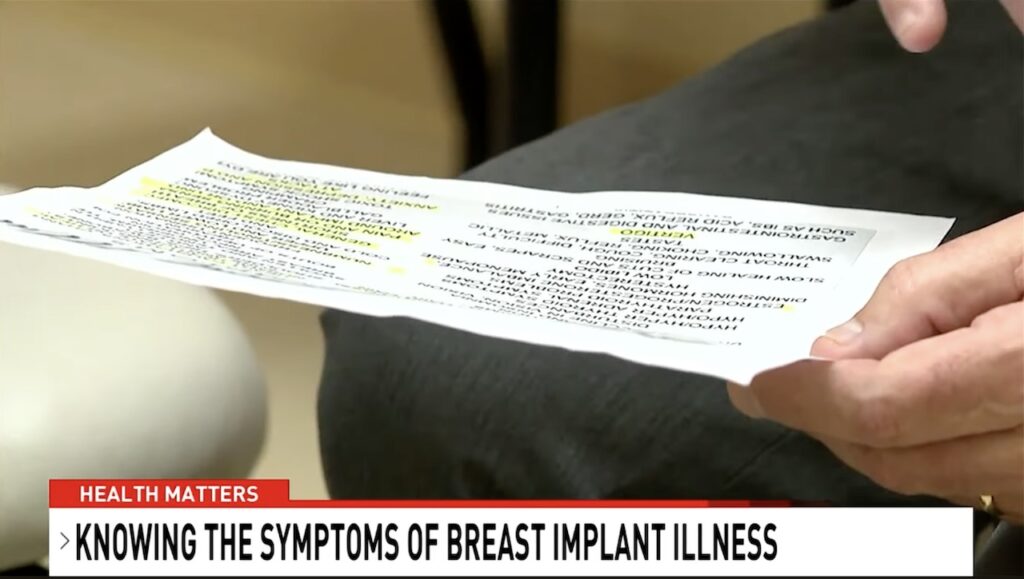An Emmy award-winning CBS News anchor says she suffered from breast implant illness, and has had her implants removed.
Five weeks post-surgery, she’s “feeling really good. Honestly.”
CBS News anchor Jasmine Brooks shared Sunday evening that last Fall, she experienced arm and chest pain and other physical symptoms, leaving her feeling anxious and unsure of what was going on.
Brooks took a trip then to the emergency room and a cardiologist, where she was cleared, but left with little answers.
“They couldn’t find anything wrong with me,” she said.
“And then I print out this [breast implant illness] symptoms list….”
That’s when she says she discovered she shared symptoms in common with “hundreds of thousands of women from around the world,” all of whom have “breast implant illness.”
On video, viewers see a handful of those symptoms highlighted, including vertigo, shortness of breath, and pain or burning around the implants.

Fatigue, Joint Pain, Anxiety and Brain Fog Among Most Common Systemic Symptoms
Fatigue, joint pain, anxiety, brain fog, autoimmune diseases, hair loss, depression, rash, headache, and weight changes (loss, gain, or other), are the most commonly-reported symptoms by women with breast implant illness, according to a December 2023 analysis of 9,458 medical device reports filed with the U.S. Food and Drug Administration.
The device reports covered the 15½-year period from January 1, 2008 to June 30, 2023.
In the 76 percent of reports containing enough information to determine date of implantation and date of symptom onset, the average time of systemic symptom onset was 5.4 years, according to the FDA’s analysis.
Women with both saline and silicone breast implants reported systemic symptoms occurring as quickly as under one year, to 42.5 years after undergoing breast augmentation surgery.

“The FDA reviewed the medical device report (MDR) database for all reports posted between January 1, 2008 and June 30, 2023 referring to a saline- or silicone-filled breast prosthesis whose event narrative included one or more of the terms listed in Appendix A, or one of the following terms or phrases:
U.S. FDA, “Medical Device Reports for Systemic Symptoms in Women with Breast Implants,” Dec. 15, 2023
- BII
- Breast implant illness
- Generalized/unexplained illness
- Unexplained systemic symptoms”
Appendix A. Search terms relevant to systemic symptoms referred to as BII
| acid reflux | ear ringing | illness | premature aging |
| adrenal | early menopause | inflammation | rash |
| allergy | easy bruising | insomnia | Raynaud |
| allergies | EBV | intolerana | reflux |
| anxiety | fibromyalgia | joint | rheumatoid arthritis |
| arthritis | fog | joint pain | scleroderma |
| autoimmune | frequent urination | kidney | shortness of breath |
| BII | gallbladder | leaky gut | SIBO |
| Breast implant illness | gastritis | libido | sick |
| candida | Fatigue | liver | sinus |
| chest discomfort | fever | lupus | Sjogren |
| choking | gastrointestinal issues | Lyme disease | sleep |
| cold | GERD | memory loss | slow healing |
| connective tissue | GI issues | metallic taste | slow muscle recovery |
| cough | hair loss | migraine | throat clearing |
| dehydration | Hashimoto | multiple sclerosis | thyroid |
| depression | headaches | muscle pain | tingling |
| difficulty swallowing | heart pain | night sweats | toxic |
| dry eyes | heart palpitations | numbness | toxic shock |
| dry hair | heart rate | pancreatitis | urinary tract |
| dry skin | hormone | panic attack | vertigo |
| dying | hysterectomy | parathyroid | weight |
| IBS | yeast |
Video: Jasmine Brooks on “Breast Implant Illness: What Every Woman Needs to Know”
Brooks calls breast implant illness a “taboo subject,” and notes that it is not yet a formal medical diagnosis, nor are any tests available to determine if one has it.
Of the nearly 300,000 women who undergo breast augmentation surgery each year, she says most have no problems.
But that some 40,000 women have problems so significant they end up explanting, or removing, their breast implants.
America’s largest society of professional plastic surgeons says in 2022, their member surgeons alone placed breast implants in 298,568 women for the first time, and removed breast implants for 37,679 women. Breast augmentation surgeries increased by 4 percent that year, while explant surgeries increased by 12 percent, they reported.
Reflective of a “movement that has taken the internet by storm,” other women shared their personal experience with Brooks, who, given the ilness’s lack of official diagnosis or tests, says the condition is “explained best by the women who say they lived it.”
Three-time cancer survivor and co-founder of the Global Patient Advocacy Coalition Robyn Towt, said breast implants have been causing problems for women since they entered the market 60 years ago.
And that today, women sick from breast implants would “fill 20 football stadiums.”
“That’s not rare,” she says.
Desperate to feel better for herself and her family, Brooks underwent breast implant removal surgery with board-certified plastic surgeon Dr. Theodore Foley at the Cosmetic & Plastic Surgery of Central Pennsylvania.
Foley was the third surgeon Brooks says she met with, and after “taking a hard look at her medical records, he was confident that breast implants were directly related to some of my symptoms.”
Now five weeks out from explant surgery, she says she is feeling well.
Brooks advises women who are considering getting breast implants to meet with more than one surgeon and to get multiple professional opinions.
